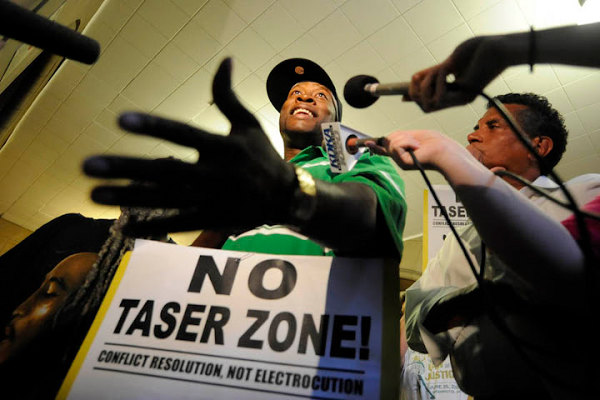Vermont Sued Again For Taser Abuse, This Time Fatal


The State of Vermont is once again defending its police in court against charges of taser abuse, but this time the taser use was fatal for a disoriented, unarmed artist suffering the after-effects of an epileptic seizure.
A civil suit filed in Orange County Superior Court by Theresa V. Davidonis of Thetford, Vermont, the surviving life partner of MacAdam Mason, alleges that the Vermont State Police committed the civil equivalent of negligent homicide when a state trooper tasered Mason and he died immediately after. The complaint, filed on July 24 by attorney Thomas Costello, calls the police conduct “malicious, wanton, willful, and outrageous.”
The state has not yet filed a response, but is expected to defend the case vigorously, as it has other, non-fatal taser abuse cases in the past.
In his filing for Davidonis, Costello demands a jury trial for the case, in which Davidonis is seeking not only compensatory damages for her pain and suffering, but an also unstated amount of punitive damages “to punish Defendants [Vermont State Police and the shooter, trooper David Shaffer] and to ensure that improper use of the TASER is not perpetuated and to deter future malicious trespass.” The suit also seeks unspecified amounts for interest, court costs, and attorney’s fees.
Less than three years ago, after a tasering in Fairlee, a town next door to Thetford, the state paid $40,000 to settle a federal lawsuit by another man who was tasered while having a seizure, which the state disputed. Like the Mason case, state police first responded to a call to help with a medical problem.
The 9-page complaint filed by Costello on behalf of Davidonis outlines a sequence of events that have been widely reported in Vermont and that are mostly not in dispute. One of the critical disputes, however, is whether or not Mason was resisting arrest, a question about which police and other eyewitnesses have diametrically opposite views.
On June 20, state police responded to a call from a suicide hotline, reportedly telling them that Mason had called in saying he was suicidal, and might hurt others. No record of this call has been made public and there is no report of Mason doing anything to harm himself or others.
Over the course of three hours, Davidonis was twice called to her home from work by a police dispatcher, to help calm the situation. Police also left the scene and returned, even though, according to the complaint, Davidonis told them to get off and stay off her property Davidonis and Mason had lived together for seven years and she had been through his difficult post-siezure behavior several times before.
For reasons that are at the crux of the lawsuit, some three hours after police first arrived on the scene, trooper David Shaffer tasered Mason in the chest, against company protocol, and Mason dropped to the ground and never became responsive again. Mason’s was the first taser-related death in Vermont, although there have been hundreds nationally.
Trooper Shaffer, who had not completed the available training for dealing with people with disabilities, first pointed an assault rifle at Mason. He switched to his taser after he understood that Mason was unarmed.
According to a report in VTDigger based on state police records, Vermont troopers have been equipped with tasers only since April 2011, except for a tactical team that had them four or five years earlier. During the past 15 months, 154 troopers have never drawn their tasers, while 53 troopers have drawn then – and used them 33 times. Trooper Shaffer had previously drawn his taser four times, but this was the first time he used it.
“It is unclear, based on police records, how often troopers have fired stun guns on people with mental health problems and/or medical conditions,” wrote Taylor Dobbs in VTDigger.
One such incident occurred in April 2011, when a Vermont State Police trooper tasered a 23-year-old man with Down Syndrome and other disabilities, because he was not being cooperative enough. In November the state police paid $7,000 to settle a complaint based on the incident.
Another part of this case was a settlement between Disability Rights Vermont and the Vermont State Police, as summarized in a joint press release:
Persons with cognitive impairments will be included within “special populations”, which are identified as requiring special consideration before being subjected to the use of an ECD .
- A person with cognitive impairments is an individual that the officer, based on training, experience, and other available information, perceives to be a person with a disability detrimentally impacting their ability to communicate, move voluntarily, understand or comply with directions.
- ECD use shall be authorized if a person with a cognitive impairment has a weapon or presents an articulable, imminent risk of harm to self or others.
- If not, EDC use shall only be authorized if there are no other reasonable alternatives to maintaining safety or taking a subject into custody.
- Mandatory Interacting with People Experiencing a Mental Health Crisis training developed pursuant to Act 80 for all Vermont State Police sworn members using a taser, with a subsequent two-year recertification in Act 80 training.
Previous Vermont taser incidents that have caused concern around the state in recent years have involved other police agencies tasering non-violent protestors chained to concrete blocks, tasering a handcuffed teenage boy in a police car, and tasering a juvenile patient in a mental hospital.
In response to rising concern, Vermont’s capitol city, Montpelier, has chosen to forego tasers for its police department and other towns such as Randolph, Hardwick, and Berlin are considering how to address their taser issues.
Taser policy is also an issue in the Democratic primary for Vermont Attorney General.



